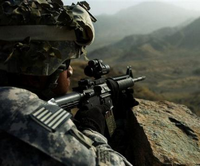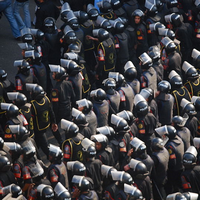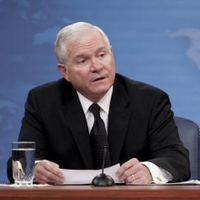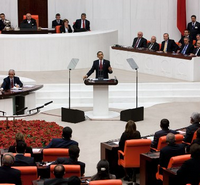 Readers know me as a big fan of both Turkey's foreign policy and the main man behind it, PM Recep Tayyip Erdogan, but this Newsweek profile contains some troubling bits worth filing away.
Readers know me as a big fan of both Turkey's foreign policy and the main man behind it, PM Recep Tayyip Erdogan, but this Newsweek profile contains some troubling bits worth filing away.
First, about his gut motivations:
Politics tends to be personal for Erdogan. “He has not forgotten that he grew up poor in the slums of Istanbul,” says an AKP strategist, declining to be named analyzing his boss’s psyche. “That’s more central to his philosophy than anything.”
Okay, hard to criticize that too much. Actually, it makes him quite appealing in his populism.
This is worse, because it suggests that, like everybody who spends more and more time at the top of the power pyramid, he's starting to confuse his destiny with the country's:
But sometimes it gets too personal. Like Russia’s Vladimir Putin, Erdogan has a street fighter’s instincts. Last year, in a ruling widely viewed as payback for years of negative coverage, Turkey’s largest media conglomerate, the Dogan Group, was slapped with a $2.5 billion tax bill. “He doesn’t listen to anyone anymore,” complains CNN Türk anchor Mehmet Ali Birand, the dean of Turkish media commentators. “He used to be a prime minister who liked the media, joked around with opponents, argued, and at times asked for their opinion. Today, he wants to destroy a huge media group with thousands of employees, silence the opposition, and create his own media.”
Politics watchers say Erdogan is becoming aloof and arrogant. Journalist Burak Bekdil has catalogued a half-dozen cases of ordinary citizens who have been arrested, beaten, and imprisoned for daring to heckle the prime minister or shout slogans in his presence. “Before the [AKP’s] creeping counterrevolution, the judiciary was somewhat slow, corrupt, partisan in all possible ways,” Bekdil complains. “Now it will feature slowness, corruption, favoritism, and partisanism in absolute favor of the ruling party.”
But here I take note that economics is driving a lot of Erdogan's strategy:
In fact, however, Turkey’s foreign--policy agenda is driven more by the country’s business interests than by Islamic identity. “Turkey’s growth is coming not from Europe but from Russia, Central Asia, the Gulf,” says [Ian] Lesser [of the German Marshall Fund in the US]. “There is no strategic decision to turn east.” Germany’s Angela Merkel and France’s Nicolas Sarkozy have made clear their antipathy toward Turkey’s full membership of the European Union. The rejection has hit Erdogan hard, say people close to him. Having invested so much political capital to implement EU--dictated reforms, Erdogan now “feels a deep sense of personal betrayal,” says the longtime backer. The prime minister himself recently told diplomats: “If the motivation of the Turkish people for full membership in the EU decreases, it’s because of EU policies toward Turkey.”
This is the flag following trade.
But here's why I still admire the man:
Erdogan, says [Brit expert Grenville] Byford, “seeks a fundamental change in [Turkey’s] relationship” with the West, to “an ally but not a subordinate.” He takes pride in the fact that Turkey has emerged strongerthan ever from the economic crisis, says the former AKP M.P. Now his No. 1 goal is to make the people rather than generals the real arbiters of Turkey’s future. Those people will doubtless in time vote him down for arrogance and for his clumsy attempts to silence opposition. But if by that time Turkey is more at peace with itself and with its neighbors, then Erdogan’s gamble will have paid off handsomely.
Erdogan will go down in history as the guy who enabled Turkey to grow up and into serious great power-dom, and that is a real gift to the entire world, given its strategic importance.
Excellent piece by Owen Matthews, who is consistently impressive.
 Monday, June 27, 2011 at 10:49AM
Monday, June 27, 2011 at 10:49AM Recent polls indicate that a majority of Americans and Europeans don't want NATO to widen its war against embattled Libyan leader Moammar Gadhafi. So long as the West's low-and-slow approach to regime change continues to weaken the dictator, there is good reason to stick with President Barack Obama's strategy of limited intervention. Yet as international cameras focus in on Libya, a prospective tipping point for the future of the Middle East becomes all the more visible in Syria, despite that country's ban on international journalists. And although Secretary of State Hillary Clinton has taken an admirably tough line regarding the Baath regime's "continued brutality," the White House still expresses more concern over Israel's policies in the West Bank and Gaza than over Syrian President Bashar al-Assad's increasingly bloody crackdown against protesters there.

 Iran,
Iran,  Israel,
Israel,  Middle East,
Middle East,  Obama Administration,
Obama Administration,  Turkey,
Turkey,  US foreign policy | in
US foreign policy | in  WPR Column |
WPR Column |  Email Article |
Email Article |  Permalink |
Permalink |  Print Article
Print Article 

































